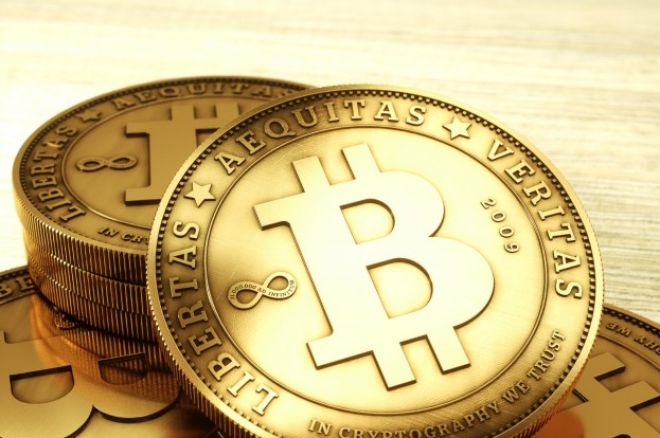PokerNews Guide To Bitcoin, Pt. 3: The Cons of Bitcoin in Online Poker

As Bitcoin becomes more and more of an emerging currency market, it should be something that is on every poker player's radar. In the PokerNews Guide To Bitcoin, Part 1: we discussed what Bitcoin is and how it can relate to poker. In Part 2, we took a look at the advantages of Bitcoin on the online felt. For Part 3, we will look at the cons of Bitcoin in online poker.
Cons of Bitcoin in Online Poker
1. Bitcoin Sites are Unregulated Offshore Sites
Poker players are all familiar with the Black Friday debacle and the problems players are still forced to deal with after Full Tilt Poker did not keep players' money in segregated bank accounts. Players also are familiar with online sites that failed because payment processors were busted by U.S. authorities, rendering those sites unable to pay back players. Although Bitcoin sites like SealswithPoker.eu promise that funds are segregated, no regulatory body backs this promise, meaning poker players' bitcoins could potentially be at risk.
According to Stuart Hoegner, the iGaming lawyer, using Bitcoin is not the potential problem; the ethics of the online poker sites are.
While using bitcoins often doesn’t require trust (in processors, in central banks, etc.), there can still be counterparty risks, depending on the nature of the transactions. Playing on a Bitcoin poker site is no different. The good emerging Bitcoin-denominated sites will strive to prove conclusively to their customers that their games are fair (e.g., there’s a random shuffle). The best sites will also think carefully about the nature of any customer bitcoins that they hold.
For U.S. players, (and potentially players in other countries, as well), there is also a risk that government might try to take action against an online site offering Bitcoin, Hoegner said.
No Bitcoin-denominated poker site has been licensed by a state or tribal authority in the United States. In many states (notably Nevada), it’s a violation of state law to carry on an Internet poker business and accept play from that state’s residents while in state when the online poker site is not licensed by the state. In Nevada, for example, the definition of prize is broad enough to capture Bitcoin. That means that a Bitcoin-denominated poker site taking business from Nevadans while in state would be in violation of state and applicable federal laws.
The U.S. government, however, may have trouble enforcing these laws, according to Hoegner. "The United States can always try to interfere with Internet gaming transactions, and we know it has done so before. However, with a non-U.S. domain-name registry and bitcoin-in bitcoin-out functionality, and other features, it gets more and more difficult for the U.S. government to control and police that environment."
Michael Hadjuk, owner and CEO of Infiniti Poker, also recognized the difficulties U.S. players face playing offshore sites and the potential struggles government bodies face in enforcing these laws, but claims that Infiniti Poker has taken steps to protect its players.
"'Risk' is a subjective term.. but I believe that risk is universally accepted to come in two forms: calculated and uncalculated," Hadjuk said. "With all that is going on in the U.S. and all of the uncertainty regarding federal regulation, the fact remains that online poker has never been defined as an illegal activity in the U.S. The only thing that is abundantly clear to me is that the UIGEA wasn't messing around when they decreed that utilizing U.S. banks to facilitate payments between online poker players and operators was, in fact, an illegal activity. So, based on the fact that we will not be allowing U.S. players to support their gaming activities through conventional banking methods, I am not of the opinion that we are taking a risk at all, at least an uncalculated one."
Hadjuk said he is "astonished" at what he calls the "significant risk" being taken by U.S.-facing operators that "continue to violate the UIGEA" when they accept bank deposits even after the Black Friday "hammer" came down.
"Frankly, I see this as not only risky, but outright irresponsible. If those accounts get seized (and we all know that scenario is no longer a hypothetical), it is the players who will lose out in the end," commented Hadjuk. "To me, it is an indication that those operators do not place players' security over profits. With regard to Infiniti, where I may willing to take on a minimal, calculated risk as it pertains to the operation, I have zero tolerance when it comes to any risk surrounding the integrity of our players' financial interests left in our care. Bitcoin's inability to become subject to seizure by third-party interventionists allows me to provide those assurances to our clients regardless as to what may or may not happen with our U.S. operational initiatives down the road."
2. The Potential for Bitcoin Volatility
"Bitcoin’s volatility is a function of its novelty and having thin liquidity. As more people adopt and transact in it, I would expect to see its volatility subside somewhat," Hoegner said. "This is a bit of a chicken-and-egg problem, as its reduced volatility may induce more people to enter the market and try to use bitcoins."
In other words, in the same way that bitcoin value can go up over time, its value can also go down, based on a variety of global factors. Like a speculative market product such as a stock or a traded commodity like oil, gold, wheat and hogs, the value of a bitcoin is determined by factors that can change its value within minutes. If you hold bitcoins as a speculator, you have no guarantee that you will realize a profit, and, ultimately, using bitcoins is speculating on a potential return. For speculating bitcoin users, the goal is to buy low and sell high, but like other commodities whose value rises and falls based on international events (i.e. U.S. regulation or potential criminalization of using bitcoins in other countries). Someone who uses bitcoins needs to understand that they could take a potential loss if bitcoin value plummets.
Editor's note: A recent report from iGaming Business cites that loss of value for Bitcoin from over $1,200 to around $450. This report came following a Dec. 6 article by Kashmir Hill at Forbes.com.
3. Bitcoin Use is Not Anonymous
Although you may be able to play poker anonymously at a Bitcoin online site without having to give personal details, one of the original reasons Bitcoin first started growing in popularity has proven untrue. The myth that the use of bitcoins is anonymous is untrue because, although difficult, the use of bitcoins can be tracked within the block chain and at the point of financial exchange to a person’s personal bank account. According to a Bitcoin wiki, "a block chain is a transaction database shared by all participating in a system based on the Bitcoin protocol."
According to Hoegner: "The relationship between Bitcoin and anonymity is complex. Bitcoin is not truly anonymous because there is often (though perhaps not invariably) a trail through the block chain. Some research has demonstrated that certain transactions can be traced back to their principals. How private one’s wallet address and encryption key are kept can also be factors. I generally don’t like to say that Bitcoin is anonymous as a general statement, but rather that Bitcoin can provide a high degree of privacy."
4. The Tax Situation
Different countries are beginning to think about bitcoins in terms of taxing profits. Although bitcoins are not yet taxed in the U.S., the day may come when you will have to report profits from a sale of bitcoins that increased in value. You can also assume that you could also declare a loss if you sold bitcoins for less than you bought them just as is the case with stocks. However, U.S. Bitcoin users will have to take a "wait and see" approach in terms of how this will play out whereas in Germany the government has declared that profits realized from Bitcoin investing are taxable, so it is logical to assume that the U.S. will go this route, as well.
According to Hoegner, poker players, as well as anyone else using bitcoins, need to keep the following in mind: "While the tax situation in the U.S. may be somewhat fluid with respect to bitcoins, I believe the correct approach is that all tax laws apply to bitcoin transactions in the normal course. Ask yourself if the underlying gaming transaction is a taxable event if cash is present, rather than bitcoins. If the answer is yes, then generally the bitcoin transaction will also be a taxable event."
5. The Potential for Collusion and Kleptography
Because some Bitcoin sites don't require player details and allow players to play from different ISP addresses, safety measures to deter collusion and give poker players the confidence that they are not being cheated are weak, at best. These sites are not forced to follow stringent rules like those required of Nevada online sites (set by the Nevada Gaming Commission), leaving players little or no means of recourse, because the sites police themselves, as well as the players.
According to Hadjuk, Infiniti has worked diligently to try to prevent security issues ranging from collusion.
"Our software is designed with algorithmic security and pattern recognition. We are aware of every move players make with every hole card, so we can use learning algorithms to search for betting patterns that look like collusion," Hadjuk said. "The software learns patterns, much like predictive searches in Google or buying pattern recognition that Visa® or MasterCard® use. Specifically, we will instruct our software to seek out recurring instances of patterns such as player pairing coupled with a lack of mutual pot contributions and disproportionate showdown recurrences. Disconnection patterns among certain players is another tactic we will employ to protect the integrity of our playing environment. All of these measures will be instrumental in helping identify collusion and fraud."
Hadjuk then continued: "At the end of the day, however, software is merely one tool we use. Player honesty and integrity is paramount and we will empower our clients to identify any suspicious activity right from their game room heads-up display (HUD) by means of a 'report abuse' function. Once we receive notification patterns against any player or players suspected of committing any act of fraud, we will cross reference those claims against our comprehensive hand history module and take the appropriate actions when it becomes necessary."
Kleptography occurs when someone uses a "back door" — encrypted software code used by unscrupulous software providers for personal gain similar to the "God mode" feature used by certain people to see other players' hole cards in the Ultimate Bet and Absolute Poker scandal. There have already been cases in which bitcoin wallets and exchanges have been hacked by people seeking to beat heavily encrypted codes, but Bitcoin itself has not been hacked.
Although hacking has not happened in Bitcoin online poker to date, according to Wired.com, a form of cyber thievery related to gaming occurred with video-game producer ESEA. This thievery raises a question of "who polices the police?" While offering a first-person shooter game called Counter-Strike and distributing "anti-cheat" software designed to keep players from getting around the computer-coding on its server, an ESEA employee took advantage of an unreleased "bitcoin mining" code. He managed, before being caught, to use the participating players’ graphics processors as a means to mine bitcoins for himself to the tune of 30 bitcoins, which given recent value, would equal roughly $12,000.
6. Bitcoin Is Not a Bank-Backed Form of Currency
Eliminating bank-backed currency was one of the primary reasons Bitcoin was created and is something Bitcoin users favor. But the fact that bitcoins are not backed by a central bank means that if the Bitcoin industry stops functioning, there is no safety net for users the way U.S. banks received government loans to stay afloat when they ran into financial trouble. In other words, there is no consumer protection if Bitcoin were to fail as a whole, so in the end, Bitcoin, like any other currency, depends on trust.
Unlike other currencies regulated by central banks, however, bitcoins value cannot be "affected the same way these other currencies can by exposure to the capricious acts of governments and central banks that inflate their currency. Bitcoins are generated at a predictable and known rate and cannot be manipulated by governments to the same degree that fiat currencies can," Hoegner said.
7. For U.S. Poker Players, State Laws Still Apply to Playing Online Poker
Depending on which U.S. state you live in, that particular state’s law regarding Internet gaming applies to playing poker online, and each state’s interpretation needs to be considered before deciding whether or not to participate, Hoegner said. "At least one state (Washington) makes it a state felony to risk or stake 'something of value upon the outcome of a contest of chance or a future contingent event.' Poker is considered a game of chance in Washington, so staking bitcoins (likely something of value in that state) in an Internet poker game would be a violation of state law there.”
Conclusion
Poker is a game of skill and luck, and the amount of risk or gamble that players have when getting involved with this form of online poker is similar to the amount of risk they have in playing an opening hand. Ultimately, once an opening hand has been dealt, a player must calculate the odds of success based on a variety of factors and then has to make decisions based on all the information available. In the end, a player can only do so much with the cards held and is subject to the variance that comes with the rest of the community cards that are dealt.
At this stage, bitcoins and Bitcoin poker sites have an intriguing amount of potential and plenty of gamble associated with them when it comes to value and potential ROI. With that being said, a person’s decision to get involved or to use bitcoins for online poker is most likely going to be similar to the decisions someone makes when playing poker.
Some players with lots of gamble will flock to Bitcoin and be aggressive despite the inherent risks just as they would when playing a hand like 2-7 off-suit, because they see a big potential payout if they hit for a minimal investment. Others will gently explore sitting at the "bitcoin table," but will back off despite being dealt the same opening hand, because they don’t like their odds of coming out a winner.
Then there are those players who will see Bitcoin as though it is an opening pair of aces, because of its constantly increasing value and their ability to play with fish in a global game. These players will go all in hoping to fade governmental, social, and economic variance and to maximize their return for their initial investment to get in the game.
Poker players who tend to play tight and take fewer risks will most likely see Bitcoin poker as a game that is over their mental (and bankroll) buy-in and will avoid playing in this market.
Last, there others who will see bitcoin use as shady and perhaps a crooked game similar to perceptions of the game in its earliest days when cheating and illegal games took place well before poker became popular on television.
Bitcoin's role in poker is still playing out and may eventually help lead to the globalization of online poker once again as its role will continue to evolve if the currency continues to gain in value and if more sites adopt Bitcoin. The opening cards have been dealt, the flop is on the table, and now players, investors, and governments are trying to anticipate what the turn and the river cards will be. Only time will tell who comes out a winner.
*Lead photo courtesy of WeLiveSecurity.com.
Get all the latest PokerNews updates on your social media outlets. Follow us on Twitter and find us on both Facebook and Google+!








